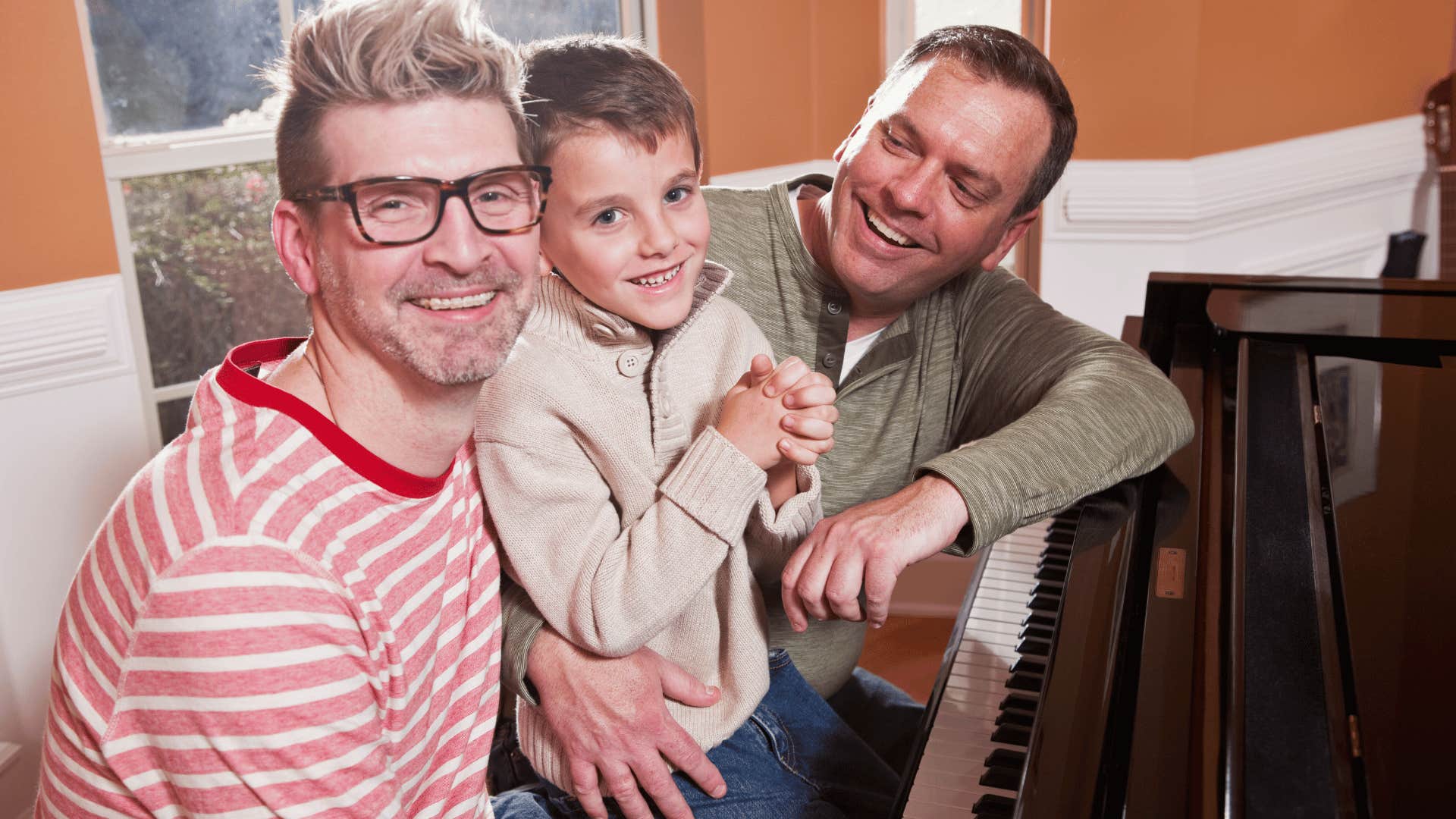11 Annoying Behaviors Of Adult Children That Actually Mean They’re Doing Great In Life
Don't be too hard your grown up kids for doing things these. After all, you taught them how.
 Krakenimages.com | Shutterstock
Krakenimages.com | Shutterstock As kids grow up, their relationship with their parents changes. In their younger years, children needed constant guidance, but entering adulthood means figuring life out on their own terms. This shift can cause conflict, as parents often misunderstand that some annoying behaviors of adult children actually means they’re doing great in life.
No matter what their differences may be, if parents and their adult kids approach each other with empathy and work to understand the other's views, they’ll wind up being closer than ever, even if they disagree.
Here are 11 annoying behaviors of adult children that actually mean they’re doing great in life
1. Pushing back in conversations
 Georgijevic via Canva
Georgijevic via Canva
It might be annoying when adult children push back in conversations, but it actually means they’re doing great in life. Parents might miss the days when their kids accepted what they said without question, but the very act of questioning shows that they’re working out what they believe in.
According to anxiety therapist Jeannie Elbing, testing the waters by talking about complicated topics “indicates they are asserting their independence, developing critical thinking and communication skills, and feeling secure enough in their relationship with their parents to express their opinions.”
Adult children won’t always automatically accept their parents’ perspective or opinions. While this can be frustrating, it’s an indication that they’re thinking for themselves and deciding how they want to live. Adult children and their parents might not agree, but they should still aim to validate and respect each other’s views.
2. Questioning traditions
 yacobchuk from Getty Images via Canva
yacobchuk from Getty Images via Canva
Traditions give families a way to stay connected in a chaotic world. Sunday night dinners can be a time of calm before the beginning of the week. Sharing pancake dinners every Christmas Eve can be a spark of joy and excitement. Passing rituals on through generations is a way to keep family histories alive, but while parents have a tendency to bristle and get defensive when their adult children question traditions, it actually means they’re doing great in life.
The American Psychological Association revealed that “routines and rituals are powerful organizers of family life that offer stability during times of stress and transition.” Psychologist Dr. Barbara H. Fiese explained that rituals feel valuable because “there is often an emotional imprint where once the act is completed, the individual may replay it in memory to recapture some of the positive experience."
While it can be painful to watch their adult children forgo family traditions, parents can take solace in knowing they raised their kids up right, which helped them feel comfortable and secure in who they are. Letting go is never easy, but forging new traditions is important, too.
3. Negotiating expectations
 Kampus Production from Pexels via Canva
Kampus Production from Pexels via Canva
It can be hard for parents to come to terms with the fact that their adult children have independent lives and a separate existence from their own. Parents won’t always like their behavior, but when adult children negotiate expectations, it actually means they’re doing great in life.
Their habit of negotiating expectations might seem annoying, but this essential skill is really a testament to how well they were raised. Learning to advocate for yourself is never easy. When parents create a family system where kids feel safe enough to express their minds, they give their kids a gift that will last a lifetime. Negotiating expectations is part of setting boundaries, which are a key part of having a healthy, stable adulthood.
As Taylor Counseling Group pointed out, people have to meet their own needs first to be able to show up for their family.
“Ask yourself what you need from yourself and others to identify which boundaries you need to establish,” they advised. “Taking your own needs into consideration and putting those needs above the needs and wants of others is a great way to get started setting your boundaries.”
4. Ignoring advice
 fizkes by Getty Images via canva
fizkes by Getty Images via canva
Above all, parents want to be valued by their adult children, which is why they feel hurt when their advice goes unheeded. Ignoring parental advice seems like adult children's annoying behavior, but it actually means they’re doing great. There’s inherent value in listening to elders’ life experiences and absorbing their wisdom, but it’s also important for adult children to carve their own way in the world.
It’s highly unlikely that adult children will walk the same path their parents did, and rejecting their advice is often a way to declare their own identity and independence. It might seem counterintuitive, but parents should feel proud when their kids discard their guidance, because it shows that they’re willing to try new things, make mistakes, and grow as people.
5. Moving away
 Ketut Subiyanto from Pexels via Canva
Ketut Subiyanto from Pexels via Canva
It’s never easy for parents to watch their kids spread their wings and leave the nest, no matter how prepared they think they are for that moment to arrive. Watching their adult children move away can be an emotionally fraught experience, but it shows how great they’re actually doing in life. It might be a parent’s dream to keep their kids close by, but moving away reveals how confident their adult children feel in new environments.
Challenging ourselves is the only way for us to grow. Moving away and into the unknown is a big step. It might stretch the connection between parents and their adult children, but it can also strengthen the bond they have.
6. Saying ‘no’ to family obligations
 SDI Productions from Getty Images via Canva
SDI Productions from Getty Images via Canva
Adult children who turn down family obligations might appear selfish from the outside, but really, they’re prioritizing their own mental health and practicing self-care, which actually means they’re doing great in life. Career and life transition coach Deborah Roth explained the value of “well-placed ‘no’s,” especially when it comes to the people we’re closest to. “Creating firmer, healthier boundaries means enjoying more supportive relationships and having more energy to do what you love,” she explained.
Reinforcing stable, healthy limitations, even with family members, she said, “significantly benefits mental well-being by reducing stress, increasing self-esteem, promoting better relationship quality, preventing burnout, and allowing individuals to prioritize their needs and values.”
“When individuals set clear limits, they are less likely to feel overwhelmed by others' expectations, [which] leads to greater life satisfaction and happiness,” Roth concluded.
7. Making decisions without giving an explanation
 Halfpoint via Canva
Halfpoint via Canva
Adult children don’t owe anyone an explanation for their decisions, no matter how much their parents might want one. Making their own choices is part of coming into their own and learning who they really are, outside of their family of origin. Parents won’t always see it this way, but making decisions without offering justification is a significant sign of how much adult children trust themselves.
As Riviera Therapy Practice pointed out, self-trust is a foundation for strong, healthy self-esteem. “When you trust yourself, you are more likely to make decisions that reflect your true desires and values rather than being swayed by external pressures or doubts,” they explained. “This alignment between your actions and inner beliefs reinforces your self-worth.”
Adult children who stand up to their parents are braver than their parents might believe, and they’re actually doing great in life.
8. Choosing an unconventional life path
 Kali9 from Getty Images via Canva
Kali9 from Getty Images via Canva
When adult children’s lives look drastically different from what their parents hoped for them, it can actually mean they’re doing great in life. Accepting their adult children’s wholehearted embrace of van life might not be a parents’ dream, but making unconventional choices is a sign that they’re being true to themselves.
Choosing to make their own oath shows that they’re confident enough to try something new, and that they won’t bend to societal expectations of what it means to be successful. Kids spend a significant portion of their childhood without agency, and exercising control over their own fate shows how great they’re actually doing.
9. Following their passions
 mihailomilovanovic from Getty Images via Canva
mihailomilovanovic from Getty Images via Canva
For as much as parents want their kids to be happy, they also want them to find stability and security. Parents won’t always approve of their adult kids’ plan to pursue their passions instead of settling into a quiet life in the suburbs with a 9 to 5 job, but that annoying behavior is a sign they’re designing their own road map and staying true to their authentic identities.
According to psychologist Dr. Sheryl Ziegler, being a supportive parent “means you validate their feelings, encourage them, and get creative when what they want is not something you can provide or think is best for them.”
“You can be supportive of their desires without compromising what you think is best,” she explained. “Listening, validating, and then creating a plan (or plan b) together is key to letting your child know you support them,” no matter how old they are.
10. Job hopping
 sturti from Getty Images via Canva
sturti from Getty Images via Canva
Parents often worry that their kids’ aren’t committed to their careers in the same way that they were as young adults, but that annoying behavior actually shows that they’re doing great navigating a rapidly-shifting job market. Job hopping might seem risky and ill-advised, but as data analyst and social activist Hannah Williams explained, switching jobs often can be a tool to push your career forward, as long as you can explain it in a smart way.
“This is something that definitely comes up with recruiters and at hiring manager interviews,” she said. “You always want to have an answer prepared for this, and the answer can change depending on what job hop you’re doing or which company you’re applying to.”
“Bottom line, if you’re job hopping, it’s because you’re looking for a better fit, and that’s the truth,” she concluded.
Parents might not approve of their adult children’s job hopping habits, but they should recognize it as their willingness and ability to pivot and make their dreams a reality.
11. Spending money on experiences
 GeorgeRudy from Getty Images via Canva
GeorgeRudy from Getty Images via Canva
Most parents want their kids to settle down, which in their minds, often means owning a home and starting a family of their own. They don’t understand why their adult children insist on putting money towards experiences instead of a mortgage, but that annoying behavior actually means they’re doing great.
Backpacking up the West Coast instead of investing in a 401K seems like an ill-informed life choice to a lot of parents, but it shows their adult children want to make the most out of the life they’re living right now. Putting money away for a rainy day is always a good idea, but the truth is, you can’t take it with you on your way to the great beyond. Parents might not understand why their adult child quit their job to follow their favorite band across the country, but they don’t actually have to understand it. Stepping back and letting their adult children make their own lives is the best form of support parents can give.
Alexandra Blogier, MFA, is a staff writer who covers psychology, social issues, relationships, self-help topics, and human interest stories.
